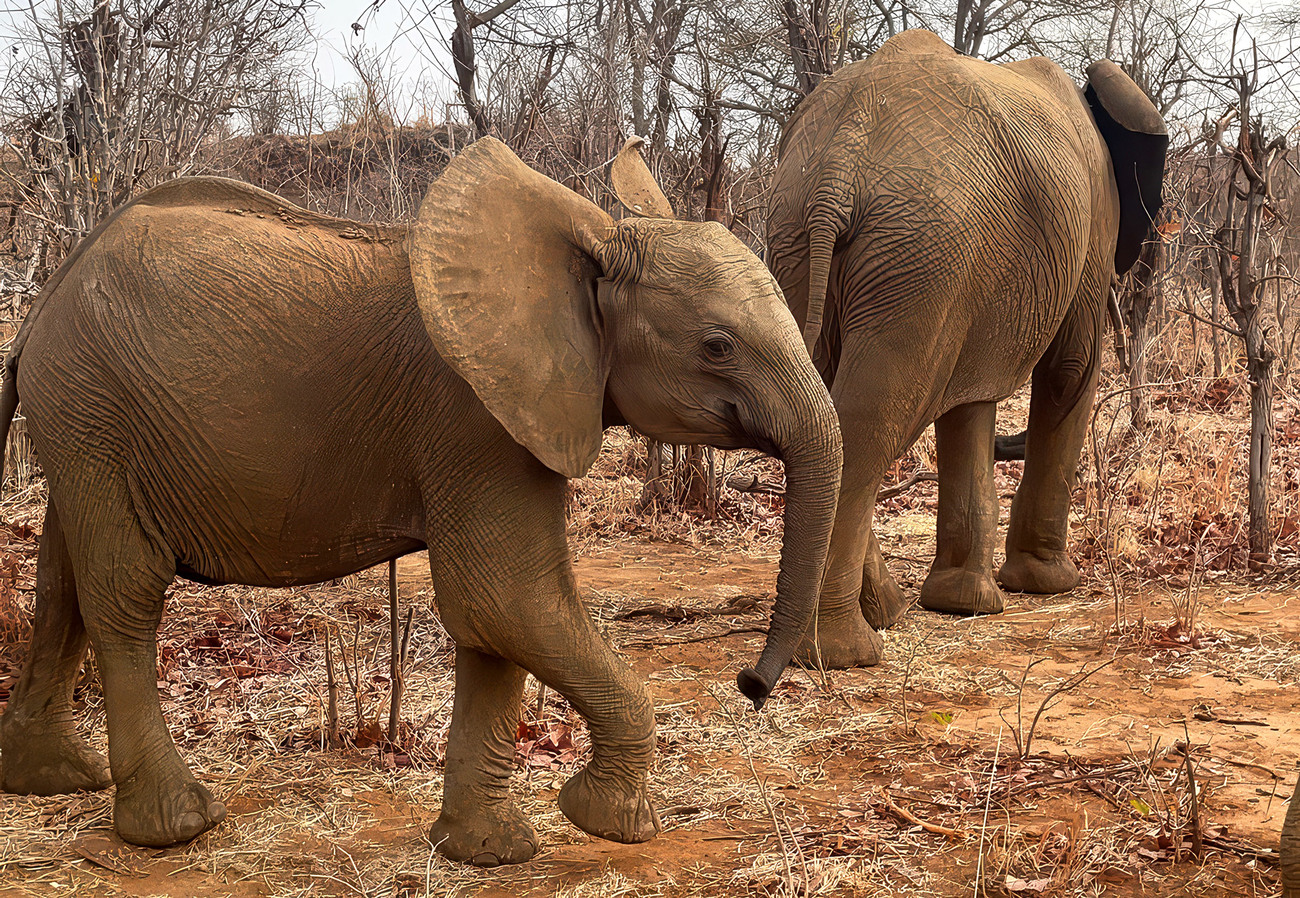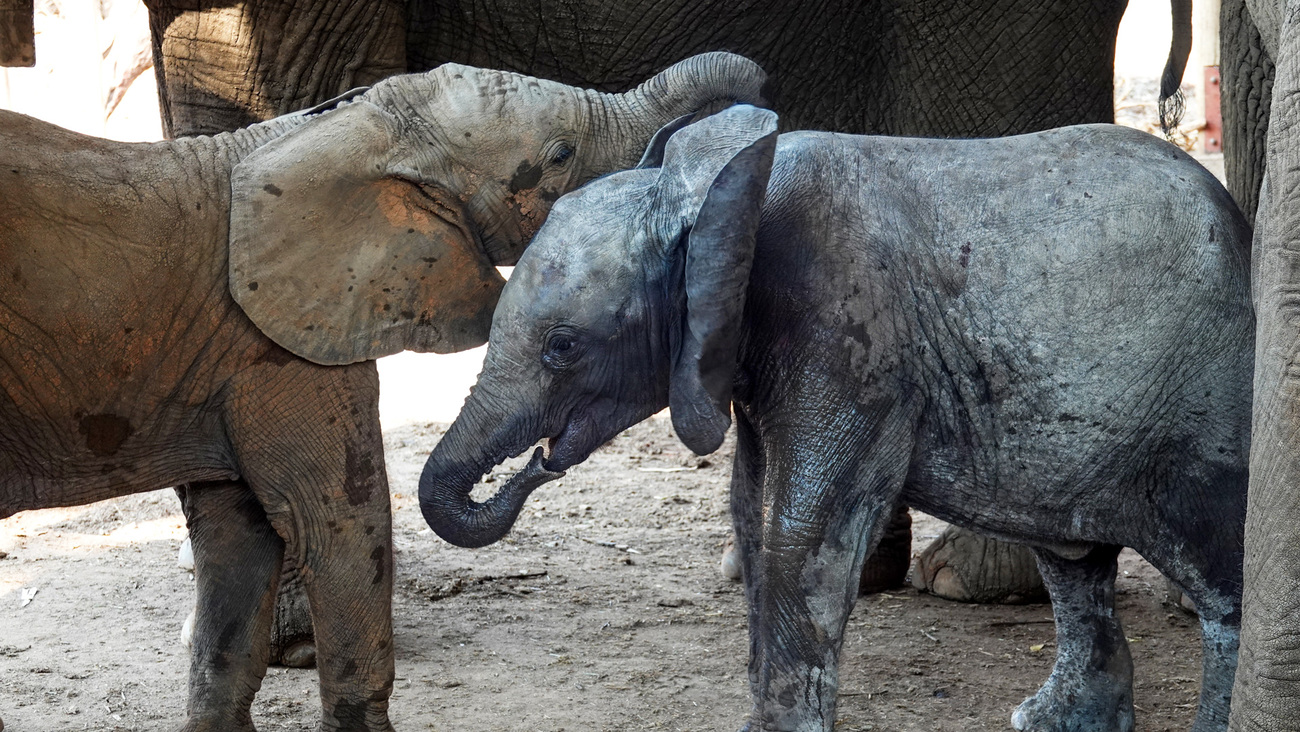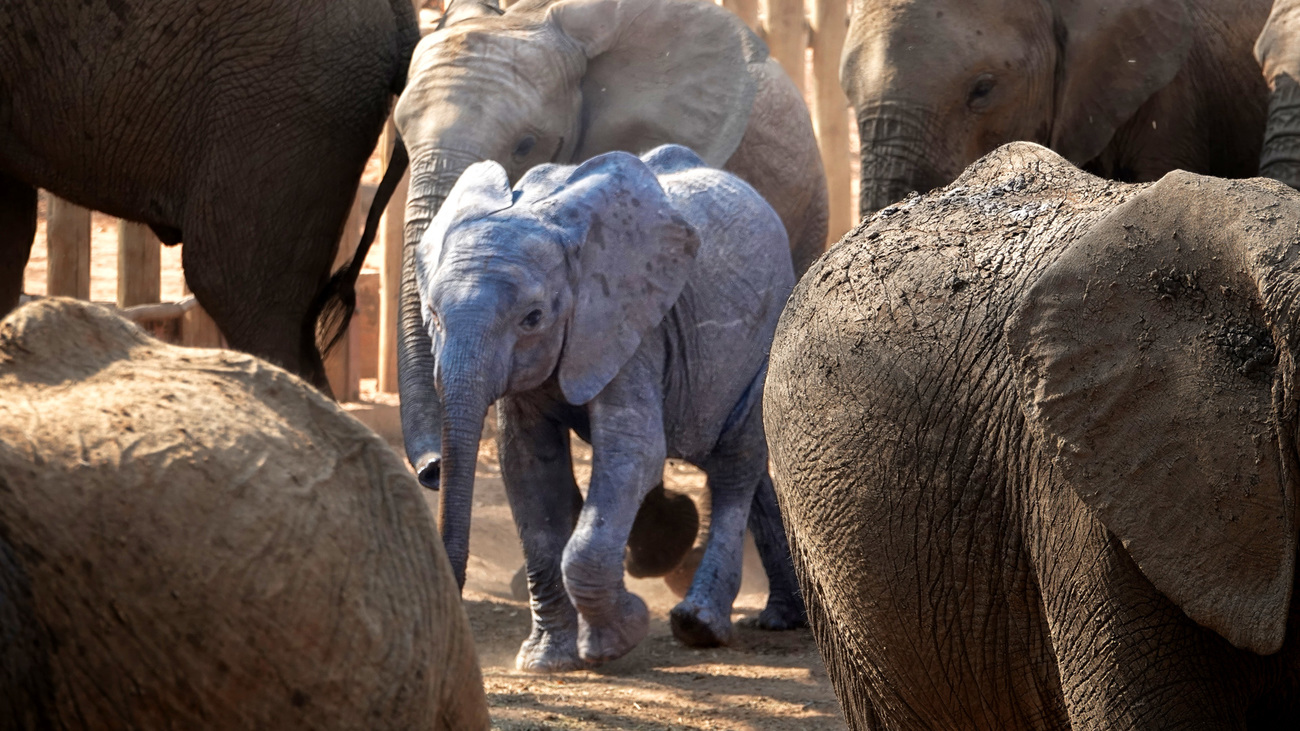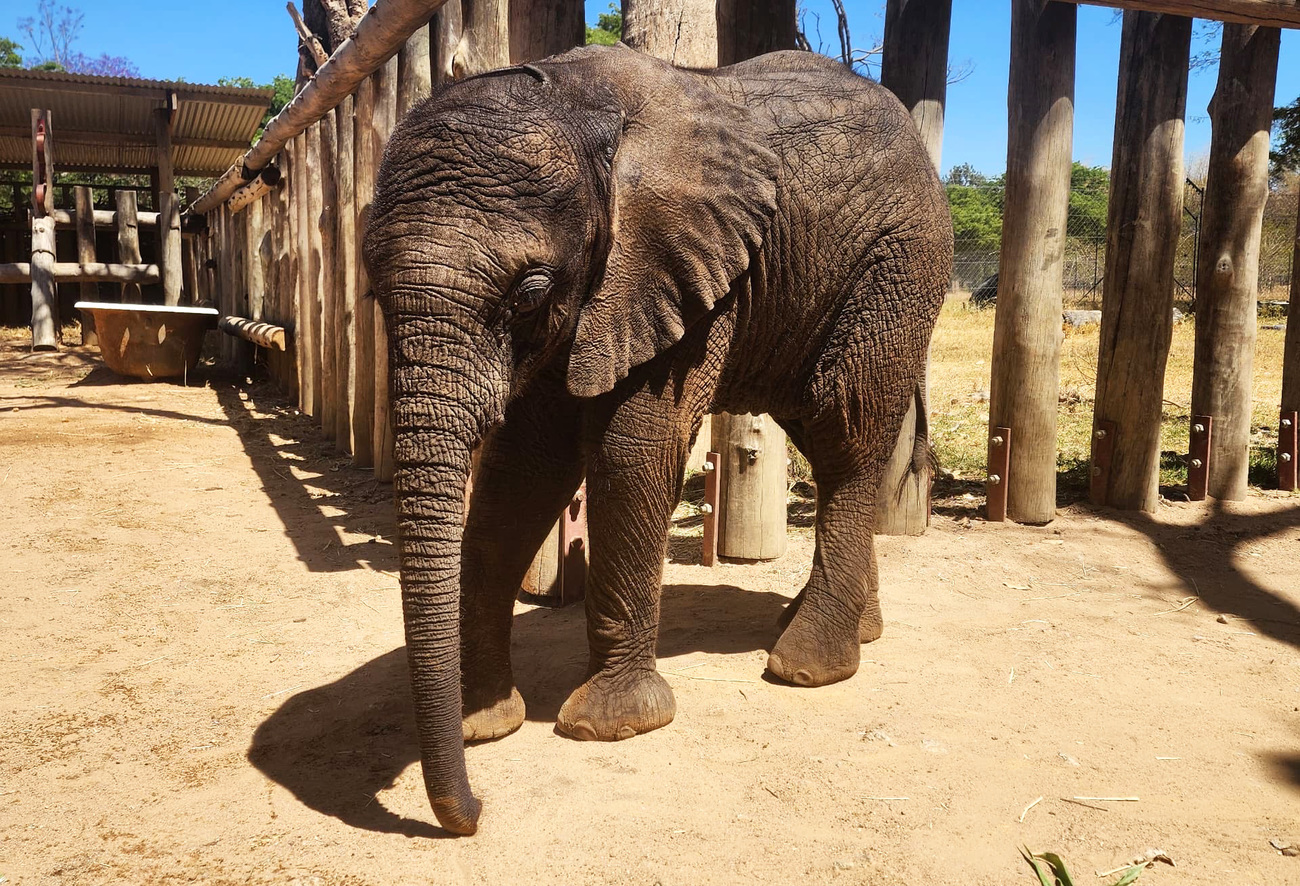Alleta Nyahuye
Wild is Life Zimbabwe Elephant Nursery: an oasis of hope for orphaned elephants—and the planet
Wild is Life Zimbabwe Elephant Nursery: an oasis of hope for orphaned elephants—and the planet
In southern Africa, April through October is already a challenging time for all species. But with the planet growing warmer and climate change impacting weather patterns, the dry season is becoming harsher, hotter, and longer. Surviving until the life-giving rains of La Niña soak the Earth is becoming more difficult with every passing year.

Humans can call states of emergency and offer aid to people and communities, but wildlife survives alone. They compete for many of the same resources as neighbouring human communities, resulting in conflict between people and wildlife.
The Wild is Life Zimbabwe Elephant Nursery (WIL–ZEN) in Harare and its release site in Panda Masuie are havens for those orphaned by such human-wildlife conflicts and the effects of severe drought. In November, when the dry season should have been coming to an end, they took in three orphaned elephants, each unique individuals with their own histories and personalities, and all with the same bright future ahead, thanks to the carers and handlers of WIL–ZEN and the Panda Masuie Release Project.
From conflict to community
Often, the fate of an orphan’s natal herd and mother are unknown. They are found wandering alone, and when rangers are unable to find the herd, they call in the carers of WIL–ZEN to take them in.
Maggie, however, was not found alone. The rescue team at Panda Masuie received the call of an eight-month-old elephant standing next to the body of her deceased mother. Traumatised by what she had witnessed but otherwise in decent health, the team brought her back to the safety of the bomas.
There, she met the herd who welcomed her in and made her feel at home. Food, water, and medical care aren’t the only things orphaned elephants need. To truly heal and begin the process of rewilding, they need companionship, empathy, and community.
Maggie has found that here with Norah, Annabelle, and Summer. Maggie and Summer, being of similar age, spend much of their time together exploring and playing. Summer, daughter to Annabelle, was a surprise birth in February 2024 at the Panda Masuie Release Project. Summer has helped the nursery feel like home for Maggie.

It will take time, and Maggie has a lot of growing to do before she returns to the wild, but she is already on her way to healing from the traumas she’s endured, thanks to the human handlers and elephant family at Panda Masuie.
Finding family
Murphy’s road to the Panda Masuie Release Project is a bit of a mystery. He was first spotted at Murphy’s Pan watering hole (his namesake) with three bulls. It isn’t often that orphaned elephants seek out bulls. But by following the males, Murphy was afforded protection and was able to find water.
He had been to the watering hole a few times, and each time, he looked worse for wear. The rangers could see that intervention was needed if Murphy was going to survive. When the bulls went to forage and Murphy couldn’t keep up, Murphy was left alone at the watering hole, vulnerable to attack—but luckily, this made him easier to rescue.
The brave team managed to get Murphy alone and bring him back to Panda Masuie. He was only a yearling, severely underweight and dehydrated. While the human handlers could fix that, only an elephant could help heal Murphy’s unseen wounds, the trauma of his life prior to rescue.
Moyo, who had been matriarch to the orphans back at WIL–ZEN in Harare and now is at Panda Masuie, jumped at the chance to get her old job back. Previously she had taken on the role of adoptive mother for Sienna, a rescued calf suffering from malnutrition.
Moyo took to Murphy immediately, and he to her. She encouraged him to drink water and milk, and she has been teaching Murphy all things elephant. There are just some things an elephant needs that no human can give them. Murphy does not leave Moyo’s side. Moyo teaches Murphy how to use his trunk, forage, and communicate—essential skills he will need for survival in the wild. In Moyo’s herd, every day is a learning experience.
Murphy has a long was to go to become fully healthy, but every day is a step toward health, happiness, and eventually, back to the wild with a bright future.

An adoptive mother’s care
Hundreds of kilometers from Panda Masuie at the Save Valley Conservancy, a five-month-old elephant wandered into a ranger’s camp. The rangers tried to find her natal herd, but she was very much alone. They called in WIL–ZEN, and rescuers brought her to the nursery in Harare.
Sometimes being rescued can be just as terrifying as being alone in the wild. Nina, named after the life-giving La Niña rainfalls Zimbabwe and neighbouring countries need so much during this extended drought, had very tough time adjusting to being saved.
She was scared and stressed, circling the stable endlessly and continuously crying. The staff of WIL–ZEN is well-versed in elephant care, and they know that sometimes what an elephant needs more than anything else is simply another elephant.
They brought in Kadiki, a young matriarch in the making, and she knew just what to do. Over the years, she has been integral in helping new orphans adjust to life in the nursery. Kadiki worked her magic, and soon Nina became calm.
Nina is a kind, gentle calf. She spends much of her day with Kadiki and her herd. She is bonding with her human carers as well, accepting milk from them and becoming more comfortable in their presence. Everyone looks forward to watching her blossom and to see who she becomes on her journey back to the wild.

The lasting impact of an individual
Each orphan rescued is a massive undertaking involving extensive amounts of food, water, supplies, and time. Each one is worth every sprout, drop of water, and minute spent. At IFAW, every individual animal matters, not just as an individual but as an irreplaceable part of the whole.
Elephants are a keystone species. Their survival is key to many other animals. They are ecosystem engineers, redesigning the landscape and combatting climate change with every step they take. They dig through dry waterbeds to unearth hidden streams, consume dangerously dry vegetation that could otherwise potentially combust in the scorching temperatures, and spread seeds through their roaming. Their massive bodies plow through the underbrush and change the very geography beneath their feet, aiding in carbon sequestration. They help protect the planet, simply by being alive.
This is why IFAW is dedicated to supporting the rescue, rehabilitation, and release of elephants. Every individual matters in the fight to save these precious ecosystems.
Hope never dries up
WIL–ZEN is not immune to the effects of the drought. The carers are working in 40- to 45-degree Celsius heat every day. Water and food are not abundant by any means, but the staff is resilient and adaptable, finding ways of conserving resources like supplementing elephant feed with alfalfa.
Orphans are doing more than just surviving under WIL–ZEN’s care; they’re thriving. And that’s in large part due to the elements that a drought cannot take from them—community, compassion, and perseverance. Every carer, both human and elephant, is dedicated to rehabilitating each and every orphan in their care to get them back where they belong: the wild.
WIL–ZEN and IFAW’s rescue efforts reach beyond the individual being taken in. WIL-ZEN in Harare and the Panda Masuie Release Project aren’t just nurseries and rehabilitation centers for rewilding. They are an oasis of hope, both for the individual calves and the future of the species.
Related content
Our work can’t get done without you. Please give what you can to help animals thrive.